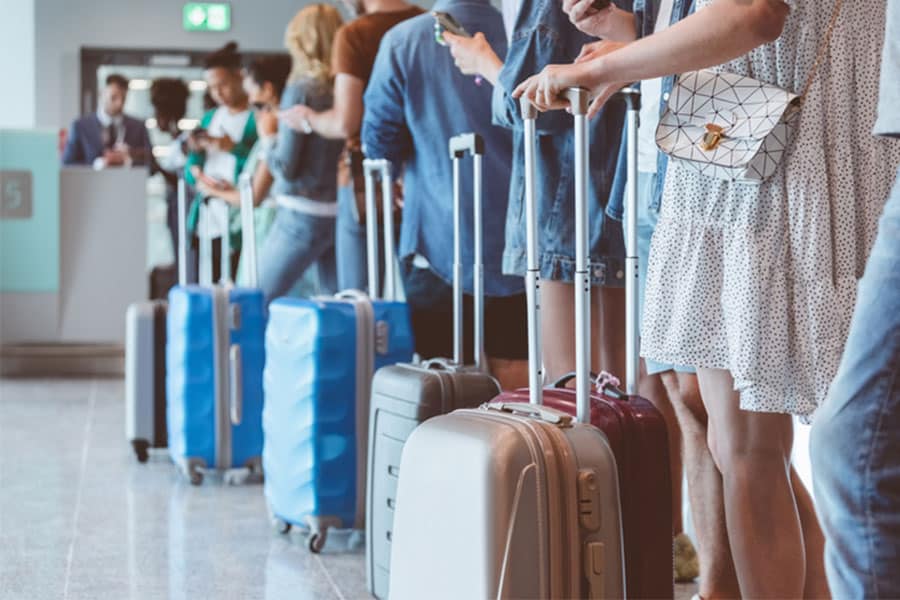One thing no one can control is the weather, and we certainly can’t control the comings and goings of airplanes on a daily basis. On average, the Federal Aviation Administration handles about 45,000 flights daily. Between 8,000 and 13,000 airplanes are in the sky at any given time, which means it takes an immense level of coordination to keep that many aircraft coming and going smoothly.
In addition to weather causing flight delays, mechanical issues can also contribute to frustrating – yet necessary – delays. Plus, the further along you go in the day, the greater the chance for encountering delays. They can be frustrating to deal with, especially when you have to be somewhere at a set time or have a connecting flight to catch.
There’s not much you can do about that. But there are some things you can control, such as flying during off-peak hours, choosing non-stop flights, and booking your DTW airport parking ahead of time.
Here’s what you can do to avoid flight delays and prepare for them to avoid panic, stress, lost time and hassle.
What Causes Flight Delays?
There are many factors that impact an airline’s arrival and departure schedule. These are all out of our control, but understanding why they happen can help. The most common flight delays are:
- Unsafe weather conditions
- Airline or airport errors
- Natural disasters
- Crew or pilot issues
- Mechanical and maintenance problems
- Ripple effects caused by other delayed flights
- Security problems/mandatory evacuations
- Air traffic congestion
- Limited runway space
The ripple effect is what can get so maddening, as one delay in the morning can cause delays throughout the rest of the day and into the night. If you see your flight is delayed coming from one destination, you can bet it will be delayed on subsequent flights as well. Staying abreast of the airline schedule can help you combat the stress that comes with not knowing.
9 Top Ways to Avoid Flight Delays
There’s not much you can do when your flight is delayed three hours due to severe weather, or when flying during extremely busy holiday times.
That said, here are some proven tips to help ensure you enjoy an on-time departure:
- Grab nonstop flights whenever you can. Can’t avoid a connecting flight? Look for longer layover times so as to compensate for any potential delays.
- Fly earlier or later if you know you’re booking during busy travel periods such as Christmas, Thanksgiving or college spring break. These peak times often bring delays, so book your flight to arrive early or late during those times if you can’t avoid those weeks.
- Be mindful of the weather. You’ll want to avoid the Gulf of Mexico during hurricane season, or New England in February when blizzards are likely. Sometimes weather events happen within days and you can’t possibly plan for them, such as when a hurricane threatens to derail your Caribbean vacation. Keep in mind, weather-related cancellations are more likely to affect flights to and from smaller towns. That’s because international flights tend to take priority.
- Refrain from booking flights at the beginning or end of the week. It’s best to fly mid-week (Tuesdays, Wednesdays and Thursdays) due to the lighter air traffic numbers. Bonus: you’ll get lower fares for traveling during the week rather than a Saturday.
- Fly in the morning if possible. Why? This is when flights have the highest chance of being on time. As the day wears on, ripple effects start to happen that are caused by flight delays from other planes. Also, adverse weather events are more common in the afternoons. If you’ve ever traveled to Orlando, for instance, you know how common afternoon thunderstorms are to that region, introducing even more delays.
- Research your chosen airport carefully. Try to avoid airports with reputations for excessive delays like New York City area airports or LAX. To avoid delays and higher prices, try smaller airports in surrounding areas for less congestion.
- Arrive at the airport early. Have everything ready to go, from passports to boarding passes. Obey all baggage and security rules, have your documents ready to be scanned, make sure your checked bags aren’t over the weight limit, and ensure your carry-on bags can be easily searched. You may unwittingly hold up your own flight when you are late or unprepared.
- Check your flight often before you leave for the airport. While you can’t control delays, you can plan better for them. This way, you don’t have to leave the house as early and camp out in the airport.
- Book parking early. Having your parking plan in place beforehand can reduce your stress significantly, and is one less thing you have to worry about when getting to the airport. Don’t contribute to your own delay by scrambling for parking when you don’t have to!
Check Out These Helpful Resources For Flight Delay Predictions
It’s wise to check your arrival and departure time so as to be prepared for any possible delays. Get current real-time flight delay info on national airports from FAA Air Traffic Control System Command Center. Here’s a handy interactive map that shows you the best and worst airports for flight delays globally.
Get in Touch With Valet Connections DTW Parking
One of the best ways to avoid delays is to adhere to your own personal timeline so you don’t end up being late to your own flight. The best way to do this is to book your valet service or DTW parking well before your flight. In fact, you should do this as soon as you book your flight. Then, you don’t have to worry about scrambling for parking later. Did you know one of the biggest reasons people are late to their gate is because they can’t find parking when they arrive at the airport? We can help you be on time, or even better — early. Call us (734) 992-4946 to book valet services and parking.


